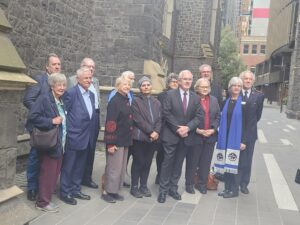
Jenan Taylor
26 September 2024
Many women clergy in the Anglican Diocese of Canberra and Goulburn have left and will continue to leave the diocese because of its lack of support for women leaders, a new report says.
It found the number of women ordinands and women in leadership roles had stagnated and declined pronouncedly since the early 1990s because of cultural, theological and organisational barriers.
Its authors warn some women could leave the church altogether.
They also believe what has been happening in Canberra and Goulburn reflects what has been happening in the Australian Church for the past decade.
Chair the Reverend Lynda McMinn said the level of hurt and anger the working group witnessed in the interviewees was deeper than anticipated, and many had become disengaged from the diocese.
Read more: One in six Diocesan, Assistant bishops a woman across Australia
Ms McMinn said patriarchal norms drove much of how women were treated.
She said many of the diocese systems and procedures were modelled on a young man with a family and domestic support.
Ms McMinn believed Canberra and Goulburn would lose the women to other dioceses, or lose them from the church altogether, if things stayed the same in the episcopate.
She said the women’s experiences had discouraged some from wanting to be ordained, and had disheartened and discouraged others who were in quite senior roles.
Ms McMinn said strong and capable women had left and gone to other diocese and were flourishing there.
She investigated after realising the number of women in leadership roles had fallen sharply by 2023.
“I realised there were no women archdeacons, and only four women rectors were left in the diocese. There were about 15 women rectors in 2015,” Ms McMinn said. “I specifically asked why after more than 30 years of women being ordained to the priesthood in this diocese there was such a decline.”
Addressing disparity: listening to the leadership experience of ordained women in Canberra and Goulburn Diocese aimed to probe the growing imbalance in numbers between men and women clergy in full-time stipended roles, based on interviews with women clergy.
Read more: Historical first as women priests ordained in Diocese of the Murray
The report noted that some women felt they were more likely to be given problematic parishes where positions were unfunded or felt set up to fail and then scapegoated for being inadequate.
It also said some of the diocesan trends since the early 1990s were:
- Leadership of parishes and of diocesan entities were dominated by men
- Overwhelmingly clergy who transferred from other dioceses were male
- A growing tendency to prefer and import men from outside the diocese rather than support and encourage the leadership of its own women
Canberra and Goulburn Bishop Mark Short said there was a sense of grief in the diocese about what women experienced because it had a proud history of involvement in women’s ordination.
Bishop Short said he was particularly saddened that there might have been women who never got leadership roles because the pathways into them were not as clear or helpful as they could have been.
He said the diocese would establish a women in leadership commission to report on the structural and cultural changes necessary to reverse its recent trends.
Women’s ordination advocate the Venerable Dr Colleen O’ Reilly believed there was a gender disparity in the Church across most of Australia because of its patriarchal nature, which many senior leaders still defaulted to.
Read more: Women’s ordination champions to celebrate 40 years of activism
Dr O’Reilly said the dioceses that continued to hold the view that women should not have positions of authority played a role too.
She said it was difficult for many women who were trying to juggle life, family and ministry jobs amid this context.
She believed a continued decline in the number of ordained women could lead to a winding back of what had been achieved in most dioceses in Australia.
“There is always pushback in response to progress, but is this just temporary, or is it actually going to lead, as it did in the Presbyterian Church, to overturning the ordination of women?” Dr O’Reilly said. “Are there people who think that’s possible? There may be some who think that that’s an achievable goal.”
For more faith news, follow The Melbourne Anglican on Facebook, Instagram, or subscribe to our weekly emails.







